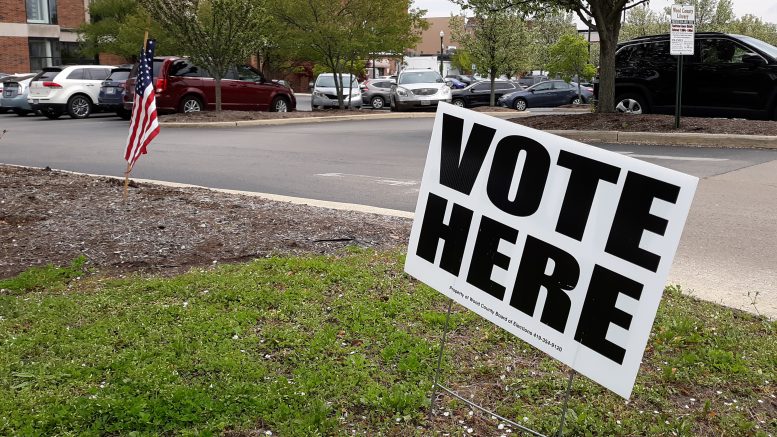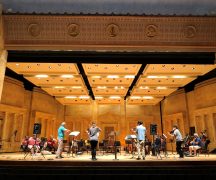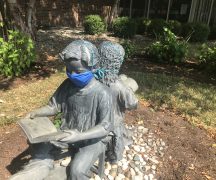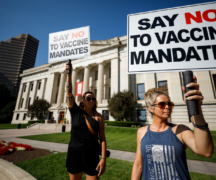By BG Independent News & Ohio Capital Journal
Poll workers in Wood County are being told not to show up to open polls for Ohio’s primary election.
This is the third time they’ve been called in a see-saw day and night when the election off, and then on again, and now, for now, off again.
The synopsis:
• Shortly before 3 p.m. Gov. Mike DeWine had a news conference in which he said a lawsuit would be filed to postpone the election in Franklin County Common Pleas Court. Message to poll workers, don’t show up.
• Common Pleas Judge Richard Frye ruled against postponing the election at about 7 p.m. Message to poll workers, yes show up.
• DeWine tweeted just after 10 p.m. that the director of the state Department of Health would “order the polls closed as a health emergency. Message to poll workers, sleep in.
DeWine tweeted: “During this time when we face an unprecedented public health crisis, to conduct an election tomorrow would force poll workers and voters to place themselves at an unacceptable health risk of contracting coronavirus.”
That was enough for Dr. Amy Acton to declare a health emergency and close the polls.
DeWine continued: “While the polls will be closed tomorrow, Secretary of State @FrankLaRose will seek a remedy through the courts to extend voting options so that every voter who wants to vote will be granted that opportunity.”
The election has been in limbo since DeWine announced at a news conference this afternoon that a petition was filed in Franklin County Common Pleas County to postpone tomorrow’s (March 17) primary election, and the state will not contest the move, and propose a new date of June 2 for in-person voting. He expressed confidence that the court will approve the move.
That state effort to postpone was denied earlier this evening by Franklin County Common Pleas Judge Richard Frye.
In a statement issued just after 9 p.m. Monday, DeWine and LaRose said it “simply isn’t possible” to hold an election Tuesday that will “be considered legitimate by Ohioans.” But they did not refer to either Frye’s ruling nor any possible appeal.
Poll workers, however, were left in a lurch, having been told not to report.
Mike Zickar, a member of the Board of Elections said after 10 p.m. that poll workers have been called and asked to report to the polls at 6:30 a.m. to open, moments later he responded with a text that the decision had been reversed.
Terry Burton, director of the Wood County Board of Elections, said in separate interviews that he lacked information about what was transpiring. Reached earlier tonight Burton said, his understanding is the issue is not settled, though he was uncertain what the next action would be he only knew as much as he was hearing on the news.
It was unclear this afternoon who would be filing the legal action, only that the state would not contest it, and the state would suggest postponing the election to June 2. ” I wish I knew more,” Burton said This is an unprecedented situation — which only got more unprecedented as the night wore on.
The Ohio Capital Journal reported that the case was filed Monday at around 5:30 p.m. It identifies two Franklin County residents as plaintiffs. They are older than 65 years old, and have not yet voted. The plaintiffs in the lawsuit — Judith Brachman and Jill Reardson — argued they are over the age of 65 and therefore are considered “vulnerable” under the Ohio Department of Health and CDC guidelines.
The complaint makes note of the Ohio Department of Health’s order from earlier Monday prohibiting gatherings of more than 50 people. Health officials have also recommended that those over 65 years old “self-quarantine,” which the two plaintiffs are said to be doing.
The complaint states that if the election is held Tuesday as originally scheduled, “Plaitiffs’ constitutional right to vote will be infringed upon.”
However, in rejecting the lawsuit Judge Frye said: that it was uncertain that conditions will have improved at a specific later date; people are harmed or disenfranchised by delay; ballots cast could be lost in a delay; and the legislature has not called an emergency session.
Frye said the legislature sets the primary election date in statute, and noted neither the governor, the Senate President, nor the Speaker of the House, convened any legislative session to change the date. He also warned of possible disenfranchisement a delay could cause, such as provisional ballots being lost.
Both DeWine and LaRose have trumpeted the safety of the elections until they abruptly changed their tone Monday afternoon and announced plans to “recommend” delaying the election until June 2. Frye, and several parties who testified at the hearing Monday evening, criticized the officials for the last-minute reversal.
“I don’t believe that plaintiffs have proceeded in a timely matter or for that matter, that the secretary has proceeded in a timely matter himself,”
“We should not force them to make this choice,” DeWine said at a Monday press briefing, announcing the lawsuit. “A choice between their health and their constitutional rights and their duties as American citizens.”
In interviews Monday night, more than a dozen pollworker in numerous counties around the state expressed confusion about the whipsaw of events throughout the day Monday.
Many said they were told after DeWine’s press conference that they were no longer needed for Monday night set-up and Tuesday night elections work.
The Franklin County Board of Elections was among the counties that sent emails and texts to some pollworkers relieving them of their duties.
Franklin County’s messages came after the judge’s ruling that the election was in fact on.
“There will not be any polling locations open tomorrow in Franklin County, therefore do not show up to serve as a Precinct Election Official,” read an email sent at 7:37 p.m. obtained by the Capital Journal.
Burton said per instructions from the state the voting machines had not been set up. Asked if that would pose a logistical problem should the vote need occur, he said, “it’s going to be a long night.”
If the governor has his way June 2 would be the day for in-person voting. Absentee voting to continue during the intervening time. The tabulation would be done then. “Votes that have already been cast, have been cast,” DeWine said. “They’ll stay there, frozen.”
DeWine said state officials have heard from people who are conflicted about wanting to vote, yet are concerned with their health. “We can’t tell people that they should stay home that the risk is high and tell them to go vote.”
DeWine is also concerned for poll workers, many of whom are older, who would be working 13-hour days and coming into contact with a lot of people. It’s not fair to them to have the polls open.
Reached after the governor’s news conference, Burton said he had advised poll workers to stop setting up for the elections, and what has been put up should taken down. “We’re anticipating not going tomorrow.”
He added: “I’ve never done anything like this before. Nobody has.”
“I believe while this is a tough decision and many may say it is the wrong decision, when we look back on this we’ll say it’s the right decision,” DeWine said.
“The health and safety of our fellow Ohioans is not negotiable,” said Secretary of State Frank LaRose. The decision had to be made because “the advice has evolved with this public health emergency, and we know it will not be safe.”
June 2 was chosen, he said, because it’s the last possible date before the Democratic National Convention in July.
DeWine said it would have been better in September, but this was “the best of the bad alternatives.”
He said that the move is a result of a rapidly changing situation. State officials are constantly learning more, and residents’ understating of the situation is also evolving.
As well as local and national primary elections are two levies for the Bowling Green City Schools.





